A resistance movement is an organized effort by some portion of the civil population of a country to withstand the legally established government or an occupying power and to disrupt civil order and stability. It may seek to achieve its objectives through either the use of nonviolent resistance, or the use of force, whether armed or unarmed. In many cases, as for example in Norway in the Second World War, a resistance movement may employ both violent and non-violent methods, usually operating under different organizations and acting in different phases or geographical areas within a country.

The Democratic Socialist Perspective (DSP) was an Australian Marxist political group, which operated as the largest component of a broad-left socialist formation, the Socialist Alliance. In 2010, the DSP voted to merge into the Socialist Alliance.

The Danish resistance movements were an underground insurgency to resist the German occupation of Denmark during World War II. Due to the initially lenient arrangements, in which the Nazi occupation authority allowed the democratic government to stay in power, the resistance movement was slower to develop effective tactics on a wide scale than in some other countries.
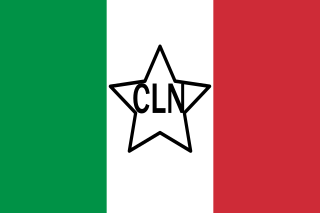
The Italian resistance movement is an umbrella term for Italian resistance groups during World War II. It was opposed to the forces of Nazi Germany as well as their puppet state local regime, the Italian Social Republic, especially following the German military occupation of Italy between September 1943 and April 1945, though the resistance to the Fascist Italian government began even prior to World War II. The movement that rose among Italians of various social classes is also known as the Italian resistance and the Italian partisans, and the brutal conflict they took part in is referred to as the Italian Liberation War or as the Italian Civil War. The modern Italian Republic was declared to be founded on the struggle of the Resistance.
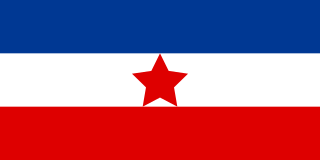
The Yugoslav Partisans, or the National Liberation Army, officially the National Liberation Army and Partisan Detachments of Yugoslavia, was the Communist-led resistance to the Axis powers in occupied Yugoslavia during World War II.
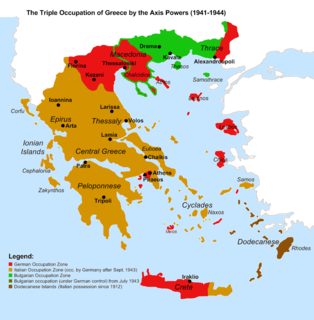
The Greek Resistance is the blanket term for a number of armed and unarmed groups from across the political spectrum that resisted the Axis occupation of Greece in the period 1941–1944, during World War II. It is considered as one of the strongest resistance movements in Nazi-occupied Europe.
Resistance movements during World War II occurred in every occupied country by a variety of means, ranging from non-cooperation, disinformation and propaganda, to hiding crashed pilots and even to outright warfare and the recapturing of towns. In many countries, resistance movements were sometimes also referred to as The Underground.

Jewish resistance under the Nazi rule took various forms of organized underground activities conducted against German occupation regimes in Europe by Jews during World War II. According to historian Yehuda Bauer, Jewish resistance was defined as actions that were taken against all laws and actions acted by Germans.The term is particularly connected with the Holocaust and includes a multitude of different social responses by those oppressed, as well as both passive and armed resistance conducted by Jews themselves.

The Belgian Resistance collectively refers to the resistance movements opposed to the German occupation of Belgium during World War II. Within Belgium, resistance was fragmented between a large number of separate organizations, divided by region and political stances. The resistance included both men and women from both Walloon and Flemish parts of the country. Aside from sabotage of military infrastructure in the country and assassinations of collaborators, these groups also published large numbers of underground newspapers, gathered intelligence and maintained various escape networks that helped Allied airmen trapped behind enemy lines escape from German-occupied Europe.
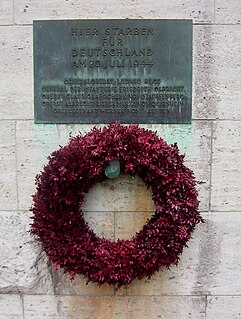
German resistance to Nazism was the opposition by individuals and groups in Germany to the National Socialist regime between 1933 and 1945. Some of these engaged in active resistance with plans to remove Adolf Hitler from power by assassination and overthrow his regime.
The National Council of the Resistance, in French Conseil National de la Résistance (CNR), was the body that directed and coordinated the different movements of the French Resistance - the press, trade unions, and members of political parties hostile to the Vichy regime, starting from mid-1943.
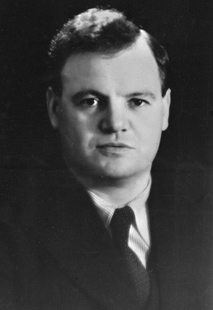
Legislative elections were held in France on 21 October 1945 to elect a Constituent Assembly to draft a constitution for a Fourth French Republic. 79.83% of voters participated. Women and soldiers were allowed to vote. 522 seats were elected through proportional representation.

The National Liberation Committee was a political umbrella organization and the main representative of the Italian resistance movement fighting against the German occupation of Italy in the aftermath of the armistice of Cassibile. It was a multi-party entity, whose members were united by their anti-fascism.
The Socialist Party of Greece was a political party in Greece. The party was formed in 1920, as an anti-Comintern minority split away at the second congress of the Socialist Labour Party of Greece. The group that founded the Greek Socialist Party was led by A. Sideris. The party was active in trade unions, and in 1931 the leading party member Dimitris Stratis was elected General Secretary of the General Confederation of Greek Workers (G.S.E.E.).
The Nordic Resistance Movement, NRM is a Pan-Nordic neo-Nazi movement and in Sweden, a political party. It is established in Sweden, Norway, Finland, and Denmark, and also has members in Iceland. It has been banned in Finland, but the ban has been appealed. The NRM has been described as a terrorist organization due to their aim of abolishing democracy along with their paramilitary activities and weapons caches.

Anti-fascism is opposition to fascist ideologies, groups and individuals. The anti-fascist movement began in a few European countries in the 1920s, and eventually spread to other countries around the world. It was at its most significant shortly before and during World War II, where the fascist Axis powers were opposed by many countries forming the Allies of World War II and dozens of resistance movements worldwide. Anti-fascism has been an element of movements holding many different political positions, including social democratic, nationalist, liberal, conservative, communist, Marxist, trade unionist, anarchist, socialist, and centrist viewpoints.
Socialist Resistance (SR) is an ecosocialist, feminist and revolutionary organisation in Britain, which publishes a Marxist periodical of the same name. In July 2009 the International Socialist Group (ISG) merged into it, making SR the British Section of the Fourth International.
The Lebanon conference was held on May 17–20, 1944, between representatives of the Greek government in exile, the pre-war Greek political parties, and the major Greek Resistance organizations, with the British ambassador Reginald Leeper in attendance. The conference occurred after an anti-monarchist mutiny among the Greek military the previous month. Prime Minister Georgios Papandreou was unable to reconcile communist and anti-communist political factions.









